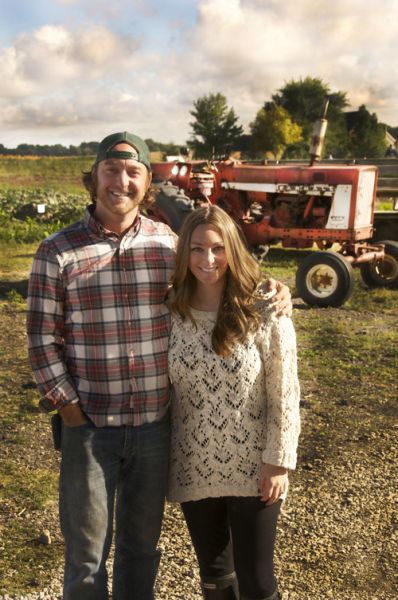Introducing The Latest Member of the GenNext Growers Advisory Board

Anthony Ndoca and Alexandra Miller (Photo credit: Pick at Garden Patch Farms)
Anthony Ndoca is a second-generation grower who owns a U-pick farm and market in Homer Glenn, IL, near Chicago. Ndoca and his sister, Alexandra Miller, purchased their family’s farm in 2013, which is now called Pick at Garden Patch Farms. Ndoca recently joined the GenNext GrowersSM advisory board and took the time to speak with us about the challenges of farming and direct marketing.
Q: How long have you been involved in your family’s business?
I’ve been involved with the family business since I was a kid. My sister and I always helped out during the summer and on weekends during apple season. Even when we had full-time jobs (before we came back to the farm), we helped out when we had time.
Q: Why did you decide to come back to your family’s farm?
My sister and I saw an upward trend in agritourism and an opportunity to work on the family farm and take it to the next level through the pick-your-own business model and through farmers’ markets and in our store on our property.
Q: What’s the most rewarding part of your job?
I feel most rewarded when our customers leave our farm more educated than when they first visited. There is so much fluff in this industry, and often times it’s difficult for a consumer to comprehend the real meaning behind many of the buzzwords they hear in regard to their food. Helping customers sort through all the misconceptions about food and being certain they leave with a real understanding is most rewarding.
Q: What’s the toughest part of your job?
The toughest part of my job is employee management. On our farm, we grow more than 200 varieties of fruits, vegetables, and herbs. Managing (and keeping) employees is challenging as priorities change by the minute due to weather and labor issues. Keeping a very strict schedule is important, but being able to remain flexible and not fall behind is even more important.
Q: How did you become interested in the specialty crops?
My interest in specialty crops grew on the farm as I watched my grandfather and grandmother grow various crops for various cultures. So many people eat different parts of different plants; almost nothing gets thrown away. I’m most interested in the transition of new varieties from the farm to the consumer. It’s exciting to see a new product hit the market and months later, have customers ask for those products or come in every week to buy the same item.
Q: What do you think are some of the biggest challenges facing the specialty crop industry today?
Without question, the answer to this question is labor. It’s difficult to find good labor at current wages. Keeping employees around for the entire season is increasingly difficult as the work is very laborious and there are jobs that are less strenuous than being a farmer — let alone a farmhand. As states are increasing minimum wages, we anticipate it will become progressively more challenging to find labor and still turn a profit.
Q: What are the biggest challenges facing young growers today?
As mentioned before, the biggest challenge is labor. If I were to make any recommendations to new farmers or potential farmers, it would be to stick with something that gives you a niche in the market and sell to a unique crowd that doesn’t require more work than you or a spouse/partner can handle. Our margins already are minimal, and with minimum wages increasing, it’s going to be difficult to find laborers that are willing to be a farmhand as opposed to a less-strenuous job.
Q: What’s the one piece of advice you wish you would have known before coming back to the farm?
When we started, I wish I would have known that it takes so much more than hard work to make a business like this succeed. Having the support of family members that have any sort of vested interest in the business also is important. It’s important for loved ones to know how much hard work is required to stay in this business, and more importantly, for them to be forgiving of your dedication to the farm.
Q: Is there anything you’d like to add?
I’m always willing to bounce ideas around with other farmers. There are so many methods for performing one easy task and I’m always looking for the simplest one. In most cases, I learn how to complete tasks by hearing how others do and vice versa.









